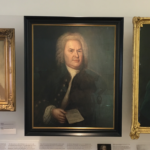The old story of the Trauer Waltz
 In 1826, a canny Viennese publisher put Schubert’s so-called Trauer Waltz into print and named Beethoven as the composer. The publisher reckoned – quite rightly, as it turned out – that the music would sell more readily under Beethoven’s name than under Schubert’s, because Beethoven’s was better known. To this day, many pianists are still unsure who actually wrote this most Schubertian of miniatures.
In 1826, a canny Viennese publisher put Schubert’s so-called Trauer Waltz into print and named Beethoven as the composer. The publisher reckoned – quite rightly, as it turned out – that the music would sell more readily under Beethoven’s name than under Schubert’s, because Beethoven’s was better known. To this day, many pianists are still unsure who actually wrote this most Schubertian of miniatures.
Schubert was comparatively unknown in his time
The muddle over the authorship of the Trauer Waltz, brings one immediately to a very interesting point about Schubert: he was comparatively unknown as a composer during his lifetime. And though, retrospectively, we regard the 1810s and 1820s as the period of Beethoven and Schubert, it was in actual fact the period of Beethoven and Rossini. Everyone knew who Beethoven was, everyone knew who Rossini was, but few people knew about Schubert. This lack of popularity has nothing to do with Schubert’s not having musical genius, but all to do, I think, with his temperament and character. He simply didn’t possess the necessary drive to promote himself.
Schubert & Beethoven could not have been more contrasting
For two composers who lived in the same city, Schubert and Beethoven couldn’t have been more contrasting if they’d tried. Beethoven was a loner, he often destroyed what friendships he had, he was irascible, he was careless, but he was a shrewd businessman and an extremely good self promoter.
Schubert by contrast adored his large circle of friends, was a socialiser, loved playing games, loved going to the pub, but had absolutely no business sense at all. In fact, if he could, he would get his friends to promote his career, arrange performances for him and approach publishers on his behalf. Not a good start for one of the greatest musical geniuses of all time.
Schubert had very few years to gain public recognition
 On the other hand, let’s think about this from a different angle, for a moment. Schubert was born in 1797, and his Op 1 – the famous song Erlkönig – didn’t go into print until 1821, when he was 24 years old; and that coupled with the first public performance of the song by Michael Vogl, also in 1821, only succeeded in bringing Schubert before the public for a period of 7 years, until his death in 1828.
On the other hand, let’s think about this from a different angle, for a moment. Schubert was born in 1797, and his Op 1 – the famous song Erlkönig – didn’t go into print until 1821, when he was 24 years old; and that coupled with the first public performance of the song by Michael Vogl, also in 1821, only succeeded in bringing Schubert before the public for a period of 7 years, until his death in 1828.
By contrast, out of the 36 years that Mozart had lived, 30 of them were spent in the public eye, and in the case of Beethoven, it was nearly 40 years. Schubert enjoyed only 7 years in the public gaze; and even then, after his death, his importance was slow to be realised.
The Unfinished Symphony only had its premier some 40 years after its composition, and the thematic catalogue of his works didn’t make an appearance until 1874, and not until 1897, was the full extent of Schubert’s music known and made available to performers.
The study day
Taking these thoughts as a starting point, Peter Medhurst leads the audience through a day of music and ideas centred on the Viennese composer. He discusses and analyses key works by Schubert – all performed live by a first class team of musicians – to reveal what it is that gives this great composer his unique and haunting musical voice.
Music to include: Piano Sonata in Bb D960, Piano Trio in Bb, Notturno, The Shepherd on the Rock, highlights from Die Schöne Müllerin and Winterreise, as well as a selection of his finest songs.




![The Scotish [sic] Gigg](https://petermedhurst.com/wp-content/uploads/2012/08/Peter120813untitled-shoot-2.jpg)